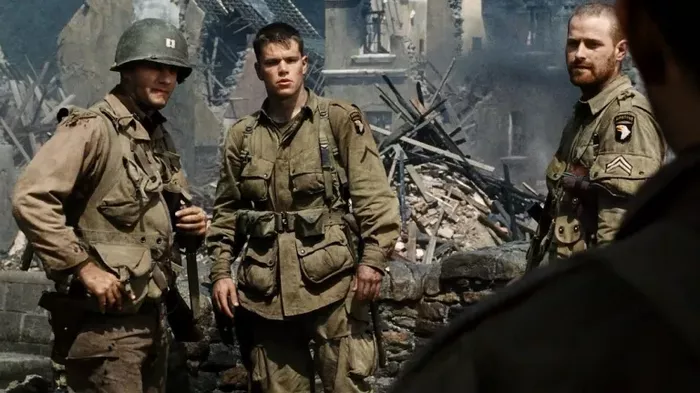Unraveling the Mystery of “FUBAR” in Saving Private Ryan
In the cinematic realm, few war movies have left as indelible a mark as “Saving Private Ryan.” Director Steven Spielberg’s visceral depiction of the harrowing realities faced by soldiers during World War II is both gut-wrenching and thought-provoking. Amidst the chaos of battle, the term “FUBAR” emerges as a succinct yet potent expression of the soldiers’ experiences. But what exactly does it mean, and does the movie accurately portray its usage in the context of that time?
The Explicit Meaning of FUBAR
“FUBAR” is an acronym that stands for “Fouled Up Beyond All Recognition” or “F***ed Up Beyond All Repair,” depending on the context. It’s a colloquial expression used by military personnel to describe situations or equipment that have gone irreparably wrong. In “Saving Private Ryan,” the term becomes a touchstone for the characters to convey the overwhelming devastation, both physical and emotional, that they face on the battlefield. Its visceral bluntness encapsulates the dire circumstances and the toll that war exacts on soldiers.
Historical Accuracy vs. Cinematic Impact
While “Saving Private Ryan” is hailed for its realistic portrayal of war, the usage of “FUBAR” sparks a debate between historical accuracy and cinematic impact. The acronym, in its modern form, wasn’t widely known during World War II. Its origin can be traced to the mid-20th century, well after the events of the film. Some critics argue that its inclusion in the movie breaks the immersion and historical authenticity of the World War II setting. However, defenders of its usage claim that the word’s essence transcends its linguistic origin, accurately capturing the soldiers’ sentiments even if the precise term might not have been used during that era.
Language Evolution and Anachronism
Language is a dynamic entity that evolves over time, reflecting societal changes and cultural shifts. The presence of anachronistic language or phrases in historical films is a common challenge. Filmmakers often grapple with the balance between maintaining period accuracy and ensuring the audience’s emotional connection to the narrative. In the case of “Saving Private Ryan,” the inclusion of “FUBAR” reflects the tension between preserving authenticity and resonating with contemporary viewers. The term acts as a linguistic bridge, enabling modern audiences to empathize with the soldiers’ experiences while acknowledging the complexities of linguistic accuracy.
Conveying the Emotional Weight of War
In the realm of cinema, linguistic precision can sometimes be sacrificed in favor of evoking raw emotions. “Saving Private Ryan” prioritizes emotional resonance to transport viewers into the brutal and chaotic environment of World War II. The use of “FUBAR” serves as a powerful tool to communicate the overwhelming and relentless nature of warfare. The film’s objective is not solely to recount historical events but to immerse the audience in the visceral horrors faced by the soldiers. In this regard, “FUBAR” becomes a conduit for empathy, enabling viewers to grasp the intense stress, fear, and anguish that define the soldiers’ experiences.
Legacy and Cultural Impact
Beyond the debate surrounding its historical accuracy, the use of “FUBAR” in “Saving Private Ryan” has left an enduring cultural impact. The term has become synonymous with chaos, destruction, and the horrors of war. It has been embraced as a representation of the indomitable spirit of soldiers who faced insurmountable odds and continued to fight. “Saving Private Ryan” has etched this acronym into the collective consciousness, solidifying its significance as a shorthand for extreme adversity.
The Nuances of Language in Film
Ultimately, the inclusion of anachronistic language in historical films requires a nuanced approach. Filmmakers must balance authenticity with the need to connect emotionally with audiences. In the case of “Saving Private Ryan,” the usage of “FUBAR” stands as a testament to the power of language to capture emotions and experiences that transcend time. The filmmakers’ decision to utilize this term, while debatable in terms of historical accuracy, contributes to the film’s resonance and impact. It serves as a stark reminder of the human toll of war and the capacity for language to encapsulate the ineffable.
Conclusion: The Lingering Echoes of “FUBAR”
As viewers revisit “Saving Private Ryan,” the term “FUBAR” continues to echo in their minds. Its presence prompts contemplation of the delicate balance between historical fidelity and cinematic immersion. While some may critique the film for its use of anachronistic language, it’s essential to recognize that the goal of the filmmakers was to convey the essence of the soldiers’ experiences rather than adhere strictly to linguistic accuracy. “FUBAR” remains a poignant emblem of the film’s themes, a stark reminder of the devastating impact of war and a testament to the enduring power of language to communicate the uncommunicable.
RELEATED READING:
-
Unshackling Chains: Contemplating Power Dynamics, Ambitions, and Relationships in Billions’ Latest Episode
-
A Bold Approach: ‘The Last of Us’ Deliberately Omits Bill and Frank’s Tragic Demise
-
Celestial Arrival: William Shatner’s Extraterrestrial Odyssey Unfolds on Stars on Mars
-
An Interstellar Revelation: Nana’s Triumph as the Unsung Hero of Blue Beetle
-
Blue Beetle’s Post-Credits Scene: A Glimpse into DCU’s Exciting Future

